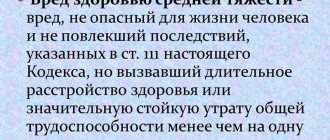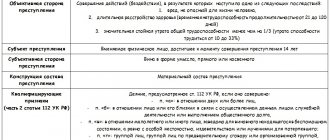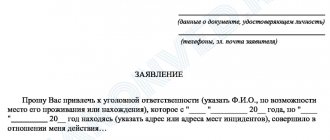The fact of causing bodily harm is a sufficient basis for satisfying a claim for compensation for moral damage. In this case, bringing the defendant to criminal or administrative liability is not a prerequisite.
Such conclusions were reached by the Judicial Collegium for Civil Cases of the Supreme Court of the Russian Federation in its ruling in case No. 78-KG17-30. This definition is included in the “Review of Judicial Practice of the Supreme Court of the Russian Federation” No. 2 (2018)” and is a guideline for all courts.
What is the damage?
According to the Constitutional rights of citizens, their health is a valuable resource and the individual’s right to freely manage their own physical potential. Violation of health, causing moderate harm to him, in itself creates a precedent for imputing liability, in particular, under Article 112 of the Criminal Code of the Russian Federation.
Reference! But regardless of the punishment received by the perpetrator, or the accrual of pension benefits due to an industrial injury, an additional penalty is allowed - for moral damage.
Moral damage is:
- Physical suffering of the injured person that accompanied him:
- like pain when injured;
- after receiving it, before starting treatment;
- during a hospital stay and undergoing painful procedures;
- after discharge during the rehabilitation process;
- in the subsequent period, if the consequences turned out to be irreversible.
- Moral suffering that may be associated:
- with humiliation if the victim was beaten;
- with a feeling of powerlessness if physical pain was intentionally inflicted;
- with worries due to disability;
- with suffering, if this affects your personal life.
Additional sanctions are provided if a complete recovery has not occurred and the victim has lost the opportunity to do what he loves or has lost attractiveness due to scars on the face or other open areas of the body. Any psychological state may be taken into account as a factor in the eligibility of claims.
Important! Humiliating actions of the perpetrators, offensive statements or untimely provision of assistance will be considered a precedent for assigning compensation.
Collection for moral damage is regulated by Article 151 of the Civil Code of the Russian Federation, which is the main provision of legislation on this issue. And also - Article 73 of the Code of Criminal Procedure of the Russian Federation, if the claim is filed as part of a criminal case.
Article 151 of the Civil Code of the Russian Federation. Compensation for moral damage
If a citizen has suffered moral harm (physical or moral suffering) by actions that violate his personal non-property rights or encroach on intangible benefits belonging to the citizen, as well as in other cases provided for by law, the court may impose on the violator the obligation of monetary compensation for the specified harm.
When determining the amount of compensation for moral damage, the court takes into account the degree of guilt of the offender and other circumstances worthy of attention. The court must also take into account the degree of physical and moral suffering associated with the individual characteristics of the citizen who suffered harm.
The crux of the matter: conflict between neighbors
S., born in 1953, filed a lawsuit for compensation for moral damage, citing the fact that she was beaten by A., born in 1988, who is her neighbor in a communal apartment.
In connection with the infliction of physical and moral suffering on her, the plaintiff asked the court to recover from the defendant compensation for moral damage in the amount of 100,000 rubles.
By a court decision, the claim was partially satisfied, and compensation for moral damage in the amount of 50,000 rubles was recovered from A. in favor of S.
Can I get compensation?
You can receive compensation provided that the court recognizes the guilty actions that led the victim to moderate damage to health as the cause of moral damage. That is, in order to receive compensation, the victim will need to prove:
- that moral suffering was actually experienced;
- that they were caused by the criminal or negligent actions of the perpetrator.
In this case, the presumption of guilt comes into force, which consists in condemning the criminal actions of the attacker and finding him guilty, on the basis of which the plaintiff’s civil claims for moral compensation are satisfied as their fact is recognized by the court.
When a crime is committed, this is a conviction under Article 112 of the Criminal Code of the Russian Federation. Or - for other intentional actions that led to the infliction of moderate damage to health. In everyday situations, legal consequences may arise if the accident was the result of the negligence of those responsible. List of domestic cases involving the negligence of other people:
- Art. 162 of the Criminal Code of the Russian Federation and 1084 of the Civil Code of the Russian Federation - in case of a broken arm;
- Art. 1064 of the Civil Code of the Russian Federation - when bitten by a dog or other animal;
- Art. 1079 of the Civil Code of the Russian Federation - in case of road accidents and other industrial injuries;
- Art. 1064 of the Civil Code of the Russian Federation - due to a fall into an open hatch due to the fault of the housing and communal services.
Here, the main factor in recognizing a claim for moral compensation will be the recognition of the negligent or intentionally guilty action of the defendant.
Moral compensation for personal injury is compensated regardless of compensation for material damage and its amount is determined as a separate amount.
How to calculate the size?
Reference! The legislation does not establish certain criteria according to which special calculation formulas can be applied.
Mostly, the amount of claims is based on subjective guidelines, but the main decision is made by the court, which has the right to recognize the claim in whole or in part, reducing its amount based on the decision made.
However, judicial practice has established certain frameworks within which the conditional settlement rule is applied. What amount can constitute compensation for moral damages for average harm to health? If you receive average harm to health, the amount of claims is determined in the range from 60,000 rubles to 480,000 rubles. In this case, the presence of intent on the part of the person and the specificity of the injuries are of primary importance.
For example, in the event of an industrial accident or an accident in which the official or driver did not have direct intent to cause harm, the claim may be awarded in the amount of 60 thousand. If the victim was not provided with timely assistance, or it caused additional suffering, the amount increases proportionately.
For example, after the fall of reinforcement that hit a builder, the site manager, without waiting for the doctors to arrive, took the worker to the hospital in his personal vehicle. Since his actions were deprived of the required experience, the affected organs were displaced in an incorrect position during transportation, which led to additional suffering for the worker and significantly increased the rehabilitation period.
After recovery, the worker filed a claim in the amount of 70 thousand rubles, which was recognized by the court in full.
The maximum amount of compensation for moral damage in the event of bodily injury and harm to health of moderate severity is accrued if the complex of criminal actions of the attacker affected the moral state of the victim extremely deeply. For example, in addition to humiliating and painful forms of harm, torture can be qualified under Article 117 of the Criminal Code of the Russian Federation. During the torture, he experienced the fear of death, and his psyche was subjected to the deepest stress.
Or, if the criminal knew that the victim was engaged in a certain type of activity, and deliberately caused harm to those parts of the body that are necessary in the professional performance of functions. For example, irreversible damage to the hands of a pianist or violinist, damage to the feet of a ballerina. And also - when the victim was obviously a minor or minor.
Criminal liability for assault
The Criminal Code provides for various penalties for beating, depending on the presence or absence of aggravating circumstances, motives for the attack and other factors. List of sanctions:
- arrest for up to six months;
- a fine in the amount of one salary or other source of income of the convicted person, but not more than 40,000 rubles (note that the offender will be required to pay this fine along with the fine for an administrative offense);
- corrective labor for a year;
- compulsory work for no more than 360 hours (meaning free performance of socially useful work);
- restriction or imprisonment for up to 2 years.
Punishment in the form of imprisonment is most often prescribed in the presence of particularly aggravating circumstances. For example, the beatings were carried out not by one person, but by a group of people who were in a preliminary conspiracy.
The identity of the victim is also of great importance - the punishment will be much more severe if a minor citizen or a person who was on duty was injured.
The court will be much more severe if any weapons were used or the damage was caused by heavy objects.
Step-by-step instruction
In order to receive compensation for moral damage, you need to file a claim as part of a criminal proceeding or separately based on the results of recognizing an accident at work. If there was a simultaneous material loss, it is permissible:
- combine penalties for moral and material damage in one application;
- file two claims at the same time;
- bring claims at different times, independently of each other.
Jurisdiction
This issue is resolved in a court of general jurisdiction of the first instance at the place (district) of the defendant’s residence in accordance with Article 28 of the Code of Civil Procedure, or at the place of consideration of the criminal case. In a criminal case, a claim may be filed in the following order:
- simultaneously with the consideration of a criminal case;
- after the court decision is made, based on the extract received.
Statute of limitations
The general limitation period according to Article 196 of the Civil Code of the Russian Federation is 3 years from the date of receipt of average harm to health. In such matters, the statute of limitations is canceled if previously caused harm has become the cause of new grave circumstances. For example, the consequences were felt after several years and led to a chronic illness, constant pain or loss of ability to work.
However, to extend the period, it will be necessary to restore the cause-and-effect relationship and prove that the cause lies in previously received injuries.
Features of drawing up an application
Recovery is required by a statement of claim drawn up in the form established by Article 131 of the Code of Civil Procedure of the Russian Federation. The header of the application is drawn up according to the general form. Name of the document: “Statement of claim for recovery of moral damages for causing harm to health of moderate severity.”
The cost of the claim is indicated at the very beginning of the document, after its name. It is entered in numbers and in words. After indicating the amount to be recovered, the main text of the application follows, which provides detailed and convincing justification for the legality of the recovery.
For your information! The text begins with the circumstances of the crime, or a description of the accident certified by the act.
Immediately you need to send a reference to the details:
- accident report;
- traffic police report on road accidents;
- materials of the criminal case;
- extracts from a court decision in a criminal case.
After this, a list of injuries received is given, indicating that they are characterized as harm to health of moderate severity. An appropriate link is provided to the conclusion of the Bureau of Medical Examiners and other documentation. The following text depends on the situation:
- It can begin from the moment the crime was committed or from the background of the incident, if this is related to the moral suffering of the plaintiff.
- You can succinctly list the injuries sustained and the amount of pain the plaintiff experienced.
- Be sure to focus on the abusive or negligent attitude of the perpetrator towards the victim.
After setting out the circumstances of the case, a petition to the court is formulated, which consists of a request:
- admit the claim;
- recover the amount of the claim from the perpetrator (indicate in numbers and words).
At the end, a date, signature and a list of attachments from among the documents that are attached as evidence are indicated.
Documents and evidence
Everything stated in the application must be supported by evidence. Evidence may include the following official documents:
- accident report;
- extract from the court decision;
- a certificate from the police department confirming the transfer of the criminal case to court;
- conclusion of the bureau of forensic examination;
- opinions of independent experts;
- extracts from the medical history;
- documents confirming the completion of psychological rehabilitation.
In addition, photographs and video materials, oral and written testimony can serve as evidence.
Attention! If the victim is in the hospital, he has the right to issue a power of attorney certified by the chief physician, transferring it to an authorized person.
Unreasonable appeal decision
In paragraph 24 of the resolution of the Plenum of the Supreme Court of the Russian Federation dated December 11, 2012 No. 29 “On the application by courts of the norms of civil procedural legislation governing proceedings in the cassation court” it is explained that when considering a cassation appeal, presentation with the case, the cassation court has no right establish or consider as proven circumstances that were not established or were rejected by the court of first instance or appellate instance.
According to Part 1 of Art. 195 of the same code, the court decision must be legal and justified. As explained in paragraph 3 of the Resolution of the Plenum of the Supreme Court of the Russian Federation dated December 19, 2003 No. 23 “On a Judicial Decision,” a decision is justified when the facts relevant to the case are confirmed by evidence examined by the court that meets the requirements of the law on their relevance and admissibility , or circumstances that do not require proof (Articles 55, 59–61 and 67 of the Code of Civil Procedure of the Russian Federation), as well as when it contains exhaustive conclusions of the court arising from established facts.
From the above provisions of the law and the explanations of the Plenum of the Supreme Court of the Russian Federation, it follows that the court evaluates the evidence and its totality according to its internal conviction, however, this does not imply the possibility of the court evaluating the evidence arbitrarily and in contradiction with the law.
The court must indicate the results of the assessment of evidence in the reasoning part of the court decision, including the reasons for which it rejects certain evidence or gives preference to some evidence over others.
These requirements in accordance with Part 1 of Art. 328 of the Code of Civil Procedure of the Russian Federation also applies to the court of appeal.
As follows from the case materials and court decisions, the conclusions of the trial court are based on a direct examination of the evidence, including the explanations of the parties and the testimony of a witness. The court's conclusions on the assessment of evidence are set out in the court decision.
Based on the materials of the case, the appellate court made the exact opposite conclusion that the fact that the defendant caused bodily harm to the plaintiff was not proven.
At the same time, in violation of the above rules of procedural law and the explanations of the Plenum of the Supreme Court of the Russian Federation, the appellate court did not provide any justification for why it rejected the evidence presented by the trial court, in particular medical documents confirming the presence of injuries, bruises, abrasions, and testimony a witness who directly indicated that the plaintiff was struck by the defendant.
When can they refuse?
Naturally, not every claim is satisfied by the court, especially in the case of a demand for material compensation. The main motive for refusing to recognize claims is the fault of the victim, which caused the accident or work injury.
And sometimes - a criminal offense, if it was associated with excess of self-defense, when the victim was attacked. The intent of the victim, qualified in accordance with the provisions of Article 1083 of the Civil Code of the Russian Federation, relieves the defendant of guilt in a civil suit.
Also, a refusal may follow if it does not clearly follow from the evidence presented that moral damage arose due to the injuries received.






